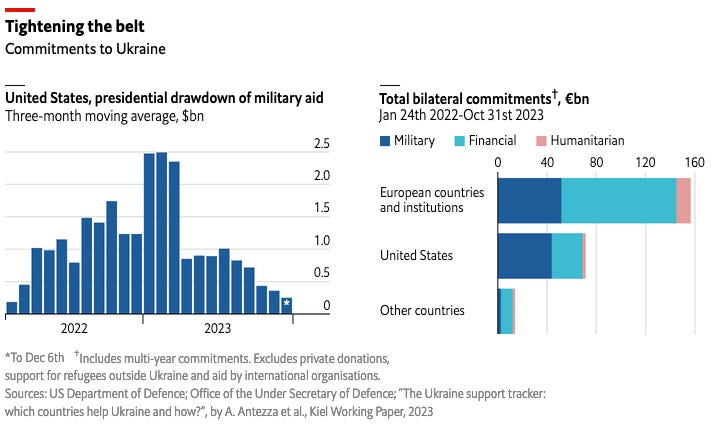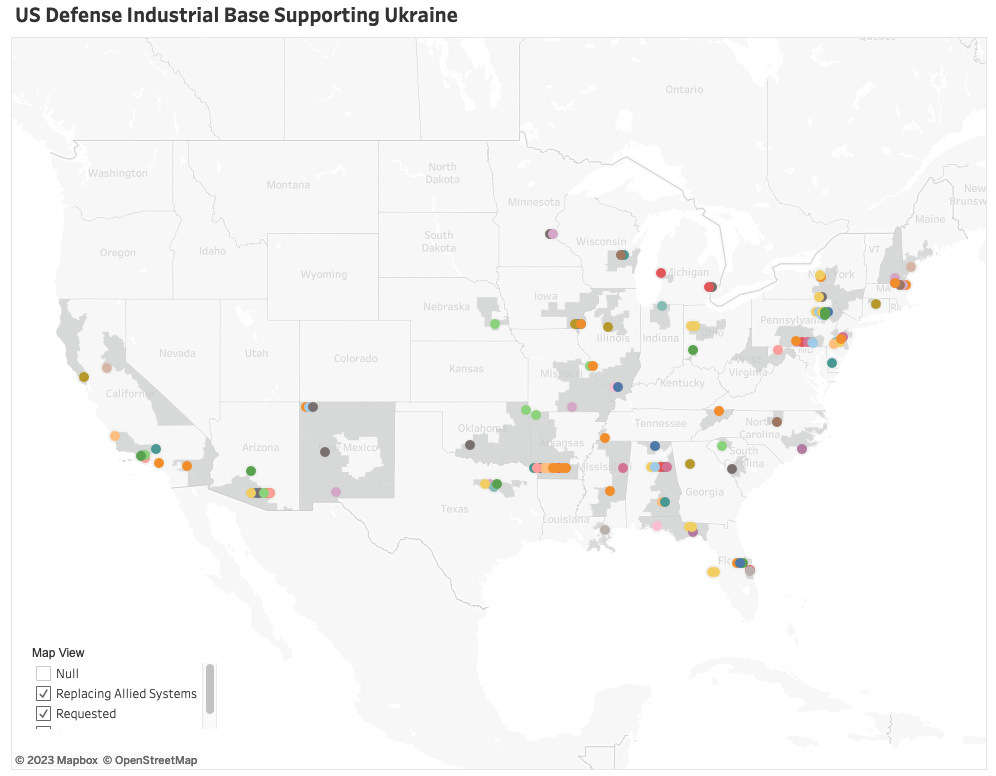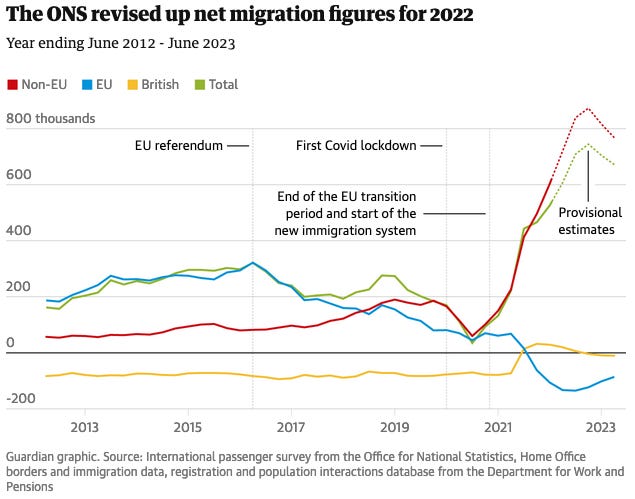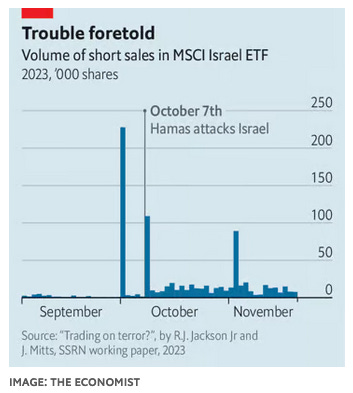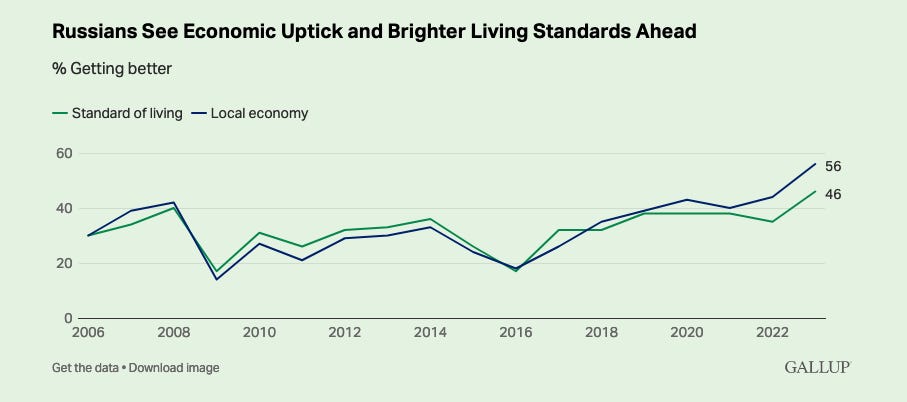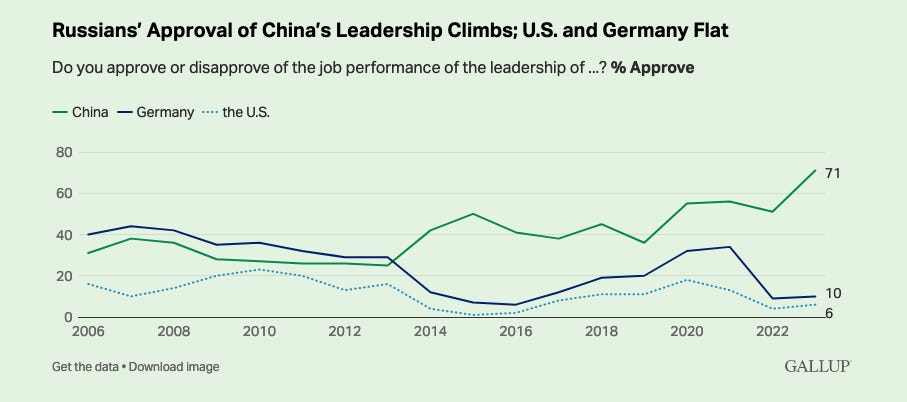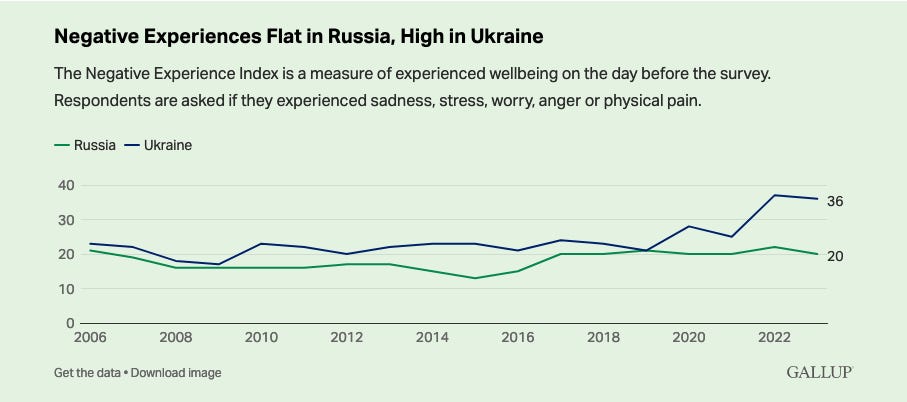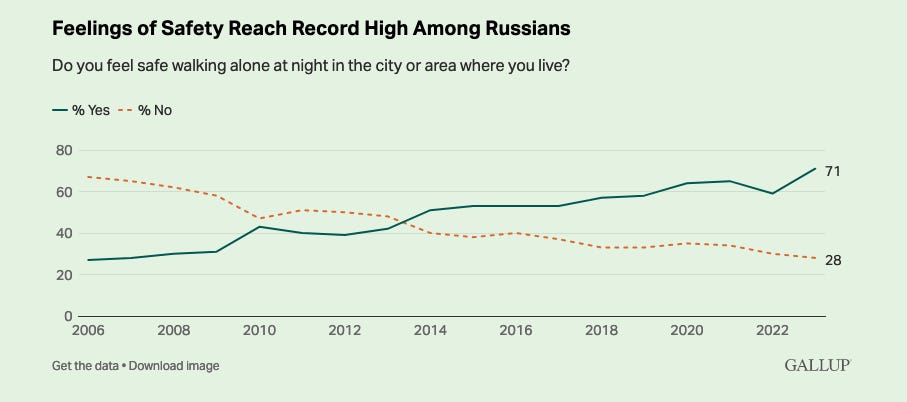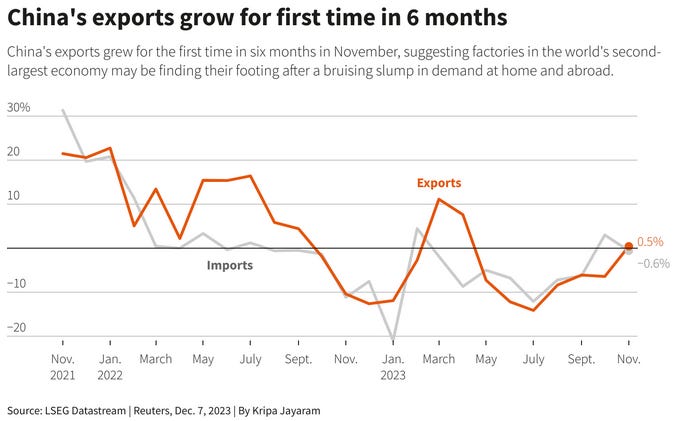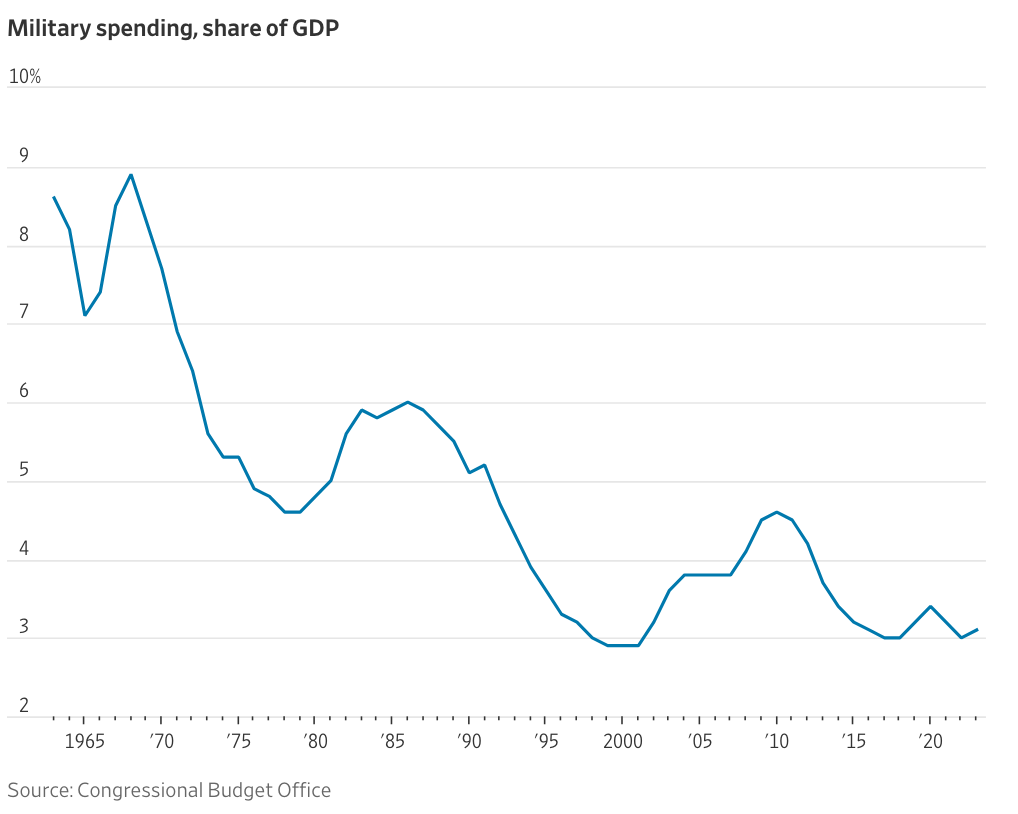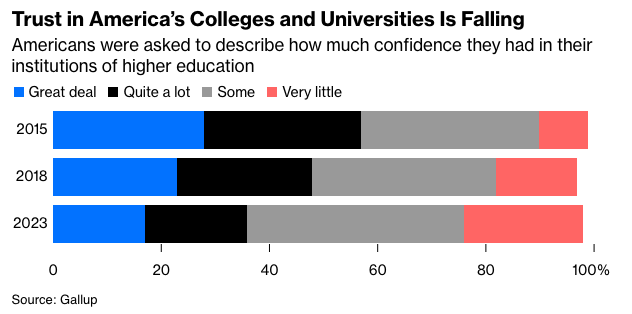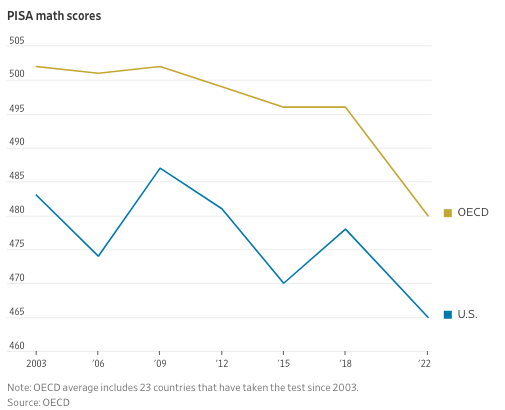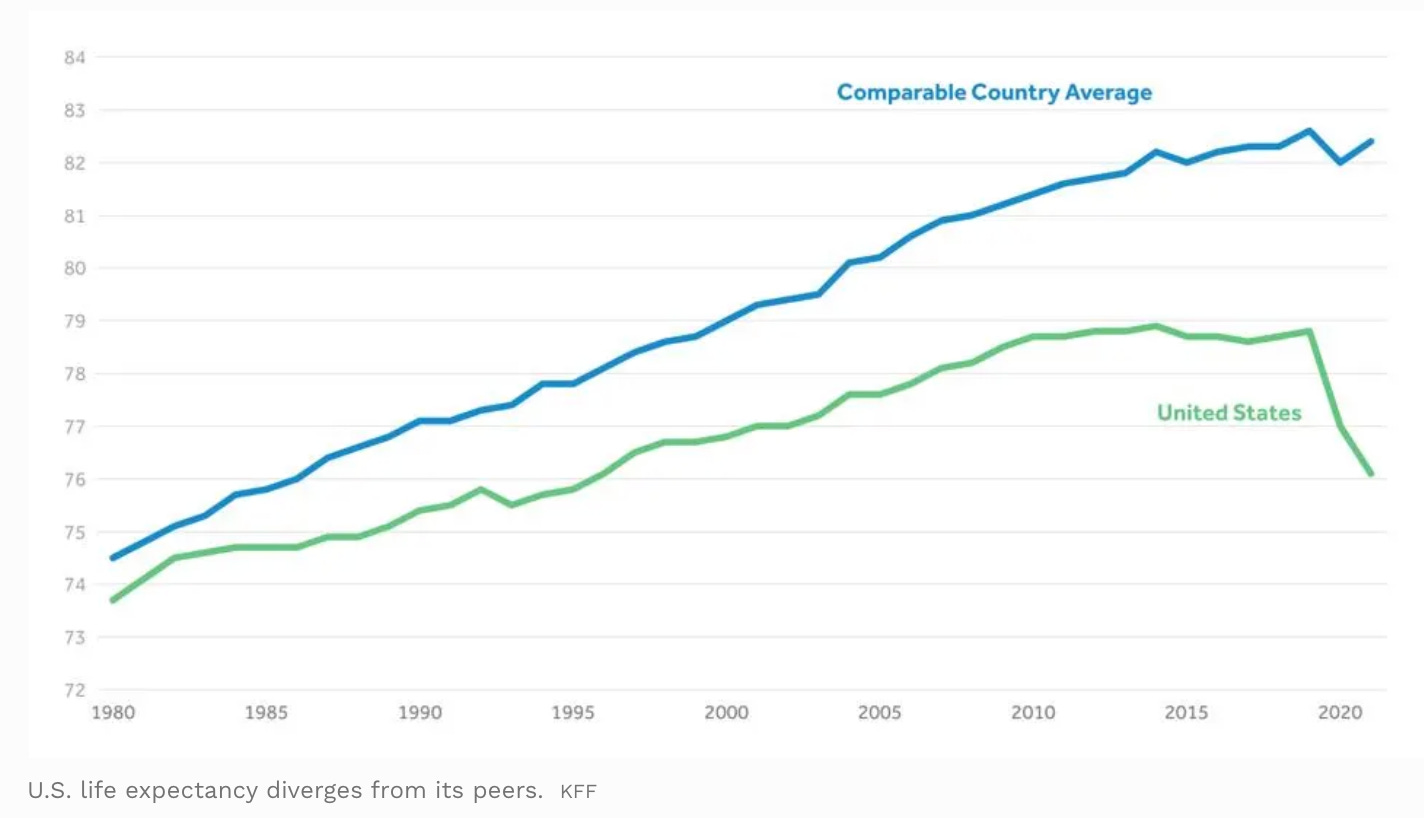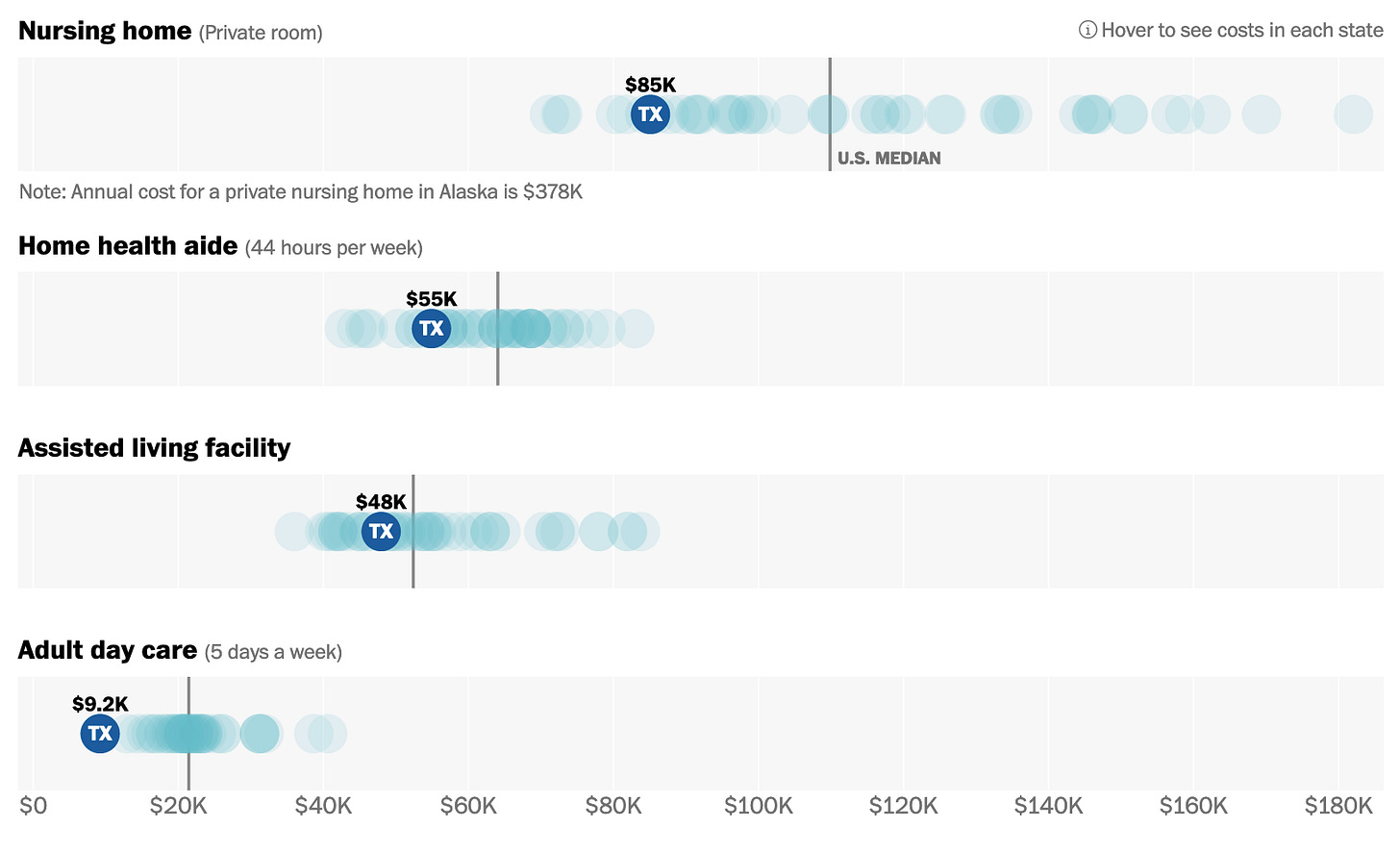👋 Hello Reader, I hope you had a great week! Below are the items that stood out to me in the news.
If you haven’t yet subscribed to Curated Compositions, please sign-up here.
THE QUICK SHOT 🚀
A lock icon (🔒) indicates articles behind a paywall, and a chart icon (📊) indicates an informative chart/graphic/video in “Slow Brew.”
World
North America
Arlington man whose house exploded had history of rambling lawsuits (WP🔒) 📊
Former U.S. Ambassador and National Security Council Official Charged with Secretly Acting as an Agent of the Cuban Government (Justice.gov)
Latin America
Venezuela's Maduro pledges to permit oil, mines development in disputed territory (Reuters)
Venezuela’s AG orders arrest of opposition members, accuses them of plotting against referendum (AP)
U.S. announces military drills with Guyana amid dispute over oil-rich region with Venezuela (CBS)
Europe
The Senate blocked aid for Ukraine. Now what? (Economist🔒) 📊
Opinion | Ukraine aid’s best-kept secret: Most of the money stays in the U.S.A. (WP🔒) 📊
Greece, Turkey seek to restart relations with meetings in Athens (Reuters)
Net migration to UK hit record 745,000 in 2022, revised figures show (The Guardian) 📊
Middle East
US Vetoes Security Council Demand for Cease-Fire in Gaza (Bloomberg🔒)
Israel Says It Has Killed Half of Hamas’s Battalion Commanders (WSJ🔒) 📊
Who made millions trading the October 7th attacks? (Economist🔒) 📊
Why Egypt has not fully opened its Gaza border for fleeing Palestinians (The Guardian)
3 commercial ships hit by missiles in Houthi attack in Red Sea, US warship downs 3 drones (AP)
Who are the Houthis and why hasn’t the US retaliated for their attacks on ships in the Middle East? (AP)
Why Yemen’s Houthis are attacking ships in the Red Sea (Economist🔒) 📊
Putin Meets Saudi Crown Prince on Rare Trip to Shore Up Ties (Bloomberg🔒)
Asia-Pacific
From the Kremlin to the Kitchen: Russian Life in 6 Charts (Gallup) 📊
Putin orders the Russian military to add 170,000 troops for a total of 1.32 million (AP)
A Prison at War: The Convicts Sustaining Putin’s Invasion (NYT🔒)
China says a US Navy ship ‘illegally intruded’ into waters in the South China Sea (AP)
Moody’s Cuts China Credit Outlook to Negative on Rising Debt (Bloomberg🔒)
China's exports grow for first time in 6 months in relief for factories (Reuters) 📊
China's military: US Navy ship 'illegally' entered territorial waters (Reuters)
On a Tiny Island in the Middle of Nowhere, 250 People Are Fending Off China (WSJ🔒)
Space
SpaceX launches South Korean spy satellite from California (Reuters)
NASA’s First Crewed Lunar Landing Since Apollo May Not Happen Until 2027 (Gizmodo)
Elon Musk's SpaceX Valued at $175 Billion or More in Tender Offer (Bloomberg🔒)
Government
The share of which voters matter in presidential elections is shrinking (WP🔒) 📊
IRS Turns Down 20,000 Refund Claims for Covid Tax Credit (WSJ🔒)
Citing Cultural Appropriation, San Francisco Tightens Rules on Candidates’ Chinese Names (SF Standard)
OPM unveils its latest tool to accelerate the federal hiring process (GovExec)
Defense
Tuberville relents on holding up 400 military promotions (The Hill)
Defense bill drops disputed abortion provisions in final compromise (Military Times)
USAF Identifies All 8 Airmen Killed in Osprey Crash (Air and Space Forces)
Air Force, Navy, Marines Order V-22 Osprey Standdowns after Deadly Crash (Air and Space Forces)
The U.S. Can Afford a Bigger Military. We Just Can’t Build It. (WSJ🔒) 📊
Ukrainian Sniper Breaks Cover to Claim World-Record Hit of More Than 2 Miles (WSJ🔒)
Economy
Business
Crypto
Energy
Explainer: What new OPEC+ oil output cuts are in place after Thursday deal (Reuters) 📊
A Pipeline Giant Is Helping to Push Texas’s Power Grid to the Brink (Bloomberg🔒) 📊
Real Estate
2024 Housing Market Forecast and Predictions: Housing Affordability Finally Begins to Turnaround (Realtor) 📊
Top Housing Markets for 2024 (Realtor)
Personal Finance
Stock Faithful Ride $7 Trillion Rally as Market Timing Backfires (Bloomberg🔒) 📊
The Surprise Bill Coming to Those Who Underpay Their Taxes (WSJ🔒)
Technology
Cyber
Actors Recorded Videos for ‘Vladimir.’ It Turned Into Russian Propaganda. (WSJ🔒)
The Untold Story of a Massive Hack at HHS in Covid’s Early Days (Bloomberg🔒)
How to Make Learning as Addictive as Social Media | Luis Von Ahn | TED (TED)
Meta Launches End-To-End Encryption For Messages On Facebook And Messenger (Forbes🔒)
Meta Sued By New Mexico For Allegedly Creating ‘Marketplace For Predators’ (Forbes🔒)
Users are doling out justice on a Chinese food delivery app (Technology Review)
Artificial Intelligence
Google takes on OpenAI with release of Gemini model (Semafor)
5000-Year-Old Tablets Can Now Be Decoded by Artificial Intelligence, New Research Reveals (The Debrief)
Elon Musk’s XAI Startup Seeking To Raise $1 Billion (Forbes🔒)
Life
Education
The Economic Case for a Liberal Arts Education (Bloomberg🔒) 📊
Ivy League presidents reckon with swift backlash to remarks on campus antisemitism (AP)
Biden administration cancels nearly $5 billion more in student loan debt (CNN)
Nearly Everyone Gets A’s at Yale. Does That Cheapen the Grade? (NYT🔒) 📊
A school promised not to send kids to the ER for misbehavior – but hospital trips only increased (AP)
Learning Loss Hit the U.S. Hard. It’s as Bad or Worse Across the World. (WSJ🔒) 📊
Health
As Bayer confronts mounting Roundup losses, all eyes on Philadelphia trial (Reuters)
Why the U.S. Spends So Much More Than Other Nations on Health Care (NYT🔒)
U.S. Life Expectancy Rises, But Only To 2003 Levels (Forbes🔒) 📊
Calculator: How much does elder care cost where you live? (WP🔒) 📊
Food & Drink
Ozempic and a Protein Shake: Food Makers Prep Weight-Loss-Drug Side Dishes (WSJ🔒)
McDonald’s unveils US CosMc's trial and global expansion (BBC) 📊
Travel
There Are a Zillion Hotel Brands Now, and That’s Just the Hiltons (WSJ🔒)
Wes Edens’ Vegas-To-California Bullet Train Moving Ahead With $3 Billion Federal Grant (Forbes🔒)
Entertainment
Taylor Swift—Who Became A Billionaire—Caps Year As Time's Person Of The Year (Forbes🔒)
A Piano With a Curved Keyboard Will Star at Carnegie Hall (NYT🔒)
Sports
The winningest active men’s college basketball coach walks away (WP🔒)
The NCAA’s Radical Proposal to Pay Division I Athletes (WSJ🔒)
The New Rule That Will Make Your Golf Ball Fly Less Far (WSJ🔒)
For the First Time, Most Golfers Play Off-Course (WSJ🔒)
For Fun
Things I Learned This Week
The Surprising Genius of Sewing Machines (YouTube) 📊
The Bookshelf
Alive by Piers Raul Read
THE SLOW BREW ☕
A more relaxed approach to news summaries.
World
Italy Tells China It's Leaving Belt and Road Initiative (VOA)
Italy officially told China that it will leave the Belt and Road Initiative, or BRI, the first country to do so since the project was launched a decade ago. Despite the decision, Rome still plans to maintain good relations with Beijing, government sources said on Wednesday. Beijing launched the BRI, a global infrastructure and transportation plan, in 2013, aiming to boost connectivity between China and nations in Eurasia, Africa, Oceania and Latin America. Critics argue that one key goal, though, is to expand the influence of the Chinese Communist Party. Nearly 150 countries, or about 75% of the global population, have joined. Italian Prime Minister Giorgia Meloni has long been critical of the partnership, once calling the 2019 decision to join the BRI a “serious mistake.” After Meloni took office last year, she said the economic promise of the deal had never materialized.
North America
Arlington man whose house exploded had history of rambling lawsuits (WP🔒)
Before an explosion leveled James W. Yoo’s two-story duplex in Arlington County, Va., during a police standoff Monday night — before the dwelling erupted in a gargantuan fireball, apparently with Yoo inside — the 56-year-old homeowner had gone through a contentious divorce, had a history of alcohol abuse and filing rambling lawsuits, and had repeatedly complained to the FBI, to no avail, that he was a fraud victim, according to authorities and court records.
Video here:
Former U.S. Ambassador and National Security Council Official Charged with Secretly Acting as an Agent of the Cuban Government (Justice.gov)
Federal prosecutors have charged Victor Manuel Rocha, 73, of Miami, Florida, a former U.S. Department of State employee who served on the National Security Council from 1994 to 1995 and ultimately as U.S. Ambassador to Bolivia from 2000 to 2002, with committing multiple federal crimes by secretly acting for decades as an agent of the government of the Republic of Cuba.
Latin America
Venezuela's Maduro pledges to permit oil, mines development in disputed territory (Reuters)
Venezuelan President Nicolas Maduro said on Tuesday he would authorize oil exploration in an area subject to a dispute with Guyana, which said it would report his comments to the United Nations and the International Court of Justice (ICJ). Maduro's pledge to permit development around the Esequibo river came after his government held a referendum over the weekend where voters rejected the ICJ's jurisdiction over the disagreement and backed creating a new state in the territory. Though Maduro has repeatedly said the referendum is binding, the ICJ - whose overall ruling on the case could be years away - last week barred Venezuela from taking any action which changes the status quo in the oil-rich region.
Venezuela’s AG orders arrest of opposition members, accuses them of plotting against referendum (AP)
Venezuela’s top prosecutor on Wednesday ordered the arrest of a dozen opposition members, including former National Assembly leader Juan Guaidó and three campaign staffers of presidential candidate Maria Corina Machado. Attorney General Tarek William Saab accused them of conspiring against the referendum the government held Sunday to claim sovereignty over a large swath of neighboring Guyana that Venezuela has long argued was stolen when the border was drawn more than a century ago.
U.S. announces military drills with Guyana amid dispute over oil-rich region with Venezuela (CBS)
The United States announced joint military flight drills in Guyana on Thursday as tensions over a contested oil-rich region with neighbor Venezuela prompted the U.N. Security Council to call an urgent meeting. A border feud has been spiraling over the Essequibo region, which has been administered and controlled by Guyana for more than a century, although Venezuela also claims the disputed area. Venezuela recently conducted a referendum, which it claims citizens supported, that aims to give Venezuela authority over the Essequibo region. Guyanese officials said in response that the country is preparing to defend itself and its borders in case of an invasion. The spat is drawing in the international community, with the U.S. announcement of military exercises the latest sign that Washington is alarmed at the threat from the authoritarian leftist Venezuelan government of President Nicolás Maduro.
Europe
The Senate blocked aid for Ukraine. Now what? (Economist🔒) 📊
AMERICA PRIDES itself as the world’s arsenal of democracy. Now the great arsenal is drying up because of political paralysis. Despite warnings that funds for Ukraine would run out by the end of the year, on December 6th Republicans in the Senate blocked a bill to provide emergency spending to support Ukraine, Israel, Taiwan and other national-security priorities. What should be a bipartisan bill has become hostage to a deeply partisan issue. Even pro-Ukraine Republicans insist that, in exchange for approving the $111bn package, Democrats should agree to tough curbs on migration across America’s southern border. President Joe Biden admits that the border system is “broken” but has rejected Republican demands as “extreme”. Negotiations will go on. Yet if they run into 2024, as some in Congress fear, it will become ever harder to reach a deal in a feverish election season. American arms packages to keep Ukraine fighting are shrinking fast (see left-hand chart). The main tool is the Presidential Drawdown Authority (PDA), which allows the Pentagon to send allies weapons from its existing stocks, which are later refilled. The Pentagon in theory has about $5bn left in the PDA account, but less than $1bn in the pot to replenish weapons supplies. Top brass may be reluctant to give away more than they are allowed to buy back.
Opinion | Ukraine aid’s best-kept secret: Most of the money stays in the U.S.A. (WP🔒) 📊
Here is the best-kept secret about U.S. military aid to Ukraine: Most of the money is being spent here in the United States. That’s right: Funds that lawmakers approve to arm Ukraine are not going directly to Ukraine but are being used stateside to build new weapons or to replace weapons sent to Kyiv from U.S. stockpiles. Of the $68 billion in military and related assistance Congress has approved since Russia invaded Ukraine, almost 90 percent is going to Americans, one analysis found.
Informative map below. Full list: https://www.aei.org/wp-content/uploads/2023/11/Ukraine-DIB-Print-outs-11-29.pdf
Greece, Turkey seek to restart relations with meetings in Athens (Reuters)
Turkish President Tayyip Erdogan sounded an upbeat note on the future of Greco-Turkish relations as he arrived in Athens on Thursday in a visit both countries hope can reboot ties after years of friction. Greece and Turkey, neighbours and NATO allies, have been at odds for decades over issues including where their continental shelves start and end, energy resources, overflights of the Aegean Sea, and ethnically-split Cyprus.
Net migration to UK hit record 745,000 in 2022, revised figures show (The Guardian) 📊
Net migration boosted the UK population by a record 745,000 in the year to December 2022, fuelled in part by a surge in overseas professionals arriving to work in the NHS and care homes and prompting a furious response from rightwing Conservatives. Amid signs No 10 might consider tightening guidelines on what has become a totemic issue for some Tory MPs, one group of backbenchers said a failure to deliver on the manifesto pledge to reduce net migration could prove “existential” for the party. Labour accused the government of “utter failure” over its stewardship of immigration and the economy, as figures showed a record numbers of asylum seekers in hotels and big increases in visas being issued to skilled workers. The Office for National Statistics (ONS) said the 745,000 figure for the year to December 2022 replaced a previous estimate of 606,000 after revisions were made to reflect “unexpected patterns” in migrant behaviour.
Middle East
US Vetoes Security Council Demand for Cease-Fire in Gaza (Bloomberg🔒)
The US vetoed a United Nations Security Council resolution that would have called for a cease-fire in Gaza, rebuffing last-ditch efforts from Arab leaders as alarm grows about Israel’s military campaign. The US was the only nation on the 15-member council to vote against the resolution, which it criticized for not condemning the Oct. 7 attacks by Hamas, including sexual violence, and said wouldn’t lead to peace. The UK abstained and 13 nations voted in favor. The resolution was introduced by the United Arab Emirates after UN Secretary General Antonio Guterres urged the Security Council to act. The proposal had nearly 100 cosponsors, a stark indication of how opposition is growing to Israel’s military campaign in Gaza. The Biden administration has also expressed reservations about the high civilian death toll but argues Israel must have the right to defend itself against Hamas, which is labeled a terrorist organization by the US and the European Union.
Israel Says It Has Killed Half of Hamas’s Battalion Commanders (WSJ🔒) 📊
Israel said it has killed about half of Hamas’s midlevel commanders in Gaza and is pressing on the suspected hiding place of the group’s leader, deploying a deliberate strategy to disrupt the militants’ ability to fight in the enclave. Israel has so far failed to assassinate the U.S.-designated terrorist group’s senior leadership, which includes Yahya Sinwar, leader of Hamas in Gaza, and Mohammed Deif, head of the group’s armed wing. But fighting is now coalescing around Khan Younis, one of Hamas’s strongholds in the southern strip, where the Israeli military says Sinwar and others could be hunkered down.
Who made millions trading the October 7th attacks? (Economist🔒) 📊
Before its attack on October 7th, Hamas maintained tight operational security. The assault blindsided Israel’s spies, and seems to have surprised even Hamas’s political leaders. But did someone know enough to profit? A new paper by Robert Jackson Jr, a former commissioner of America’s Securities and Exchange Commission, and Joshua Mitts of Columbia University suggests so. The authors’ most striking finding is a surge in short sales—bets that a security’s price will fall—of an exchange-traded fund (etf) listed on the New York Stock Exchange under the ticker eis, which tracks an index of Israeli shares. In September an average of 1,581 shares a day of EIS were sold short, representing 17% of the daily total trading volume. On October 2nd, five days before the attacks, a whopping 227,820 shares were shorted, representing 99% of total volume. Rather than reflecting a souring of market sentiment, the increase in activity seems to have come from just two trades. Then, on the first trading day after the attack, standard “long” transactions outnumbered short sales by a similar number of shares (248,009). If these trades were made by the same investor, they would correspond to a $1m profit. Other securities also showed suspicious patterns. During the three weeks before the attacks, the number of outstanding options contracts expiring on October 13th on American-traded shares of Israeli firms—the derivatives that would yield the greatest returns if prices moved sharply in the direction a trader expected—rose eightfold. In contrast, the number of longer-dated options on such shares, whose value depended on events beyond mid-October, barely changed.
Why Egypt has not fully opened its Gaza border for fleeing Palestinians (The Guardian)
Egypt has been caught in a dilemma for weeks about opening the Rafah crossing into Gaza: wanting to help the most seriously injured Palestinians leave, but adamantly refusing to contemplate a surge of Palestinian refugees into the Sinai peninsula. “We are prepared to sacrifice millions of lives to ensure that no one encroaches upon our territory,” Egypt’s prime minister, Mostafa Madbouly, said earlier this week. Some have criticised Egypt and its authoritarian president, Abdel Fattah El-Sisi, for not opening his borders to the Palestinians since the Israeli bombardment began in response to the murderous Hamas rampage of 7 October. Palestinians fear a repeat of what they call the Nakba, or catastrophe – the expulsion of 700,000 Palestinians in 1948 after the creation of Israel. It appears also that Egypt does not want to repeat the experience of Lebanon and Jordan, which have been housing Palestinian refugees for decades. Sisi considers the housing of up to 1 million Palestinians in camps in his country a political risk not worth taking.
3 commercial ships hit by missiles in Houthi attack in Red Sea, US warship downs 3 drones (AP)
Ballistic missiles fired by Yemen’s Houthi rebels struck three commercial ships Sunday in the Red Sea, while a U.S. warship shot down three drones in self-defense during the hourslong assault, the U.S. military said. The Iranian-backed Houthis claimed two of the attacks. The strikes marked an escalation in a series of maritime attacks in the Mideast linked to the Israel-Hamas war, as multiple vessels found themselves in the crosshairs of a single Houthi assault for the first time in the conflict. The U.S. vowed to “consider all appropriate responses” in the wake of the attack, specifically calling out Iran, after tensions have been high for years now over Tehran’s rapidly advancing nuclear program.
Who are the Houthis and why hasn’t the US retaliated for their attacks on ships in the Middle East? (AP)
When Iranian-backed Houthi rebels in Yemen launched missiles and hit three commercial ships in the southern Red Sea last weekend, it triggered an immediate question: Will the U.S. military strike back? The Houthis have sharply escalated their attacks against ships as they sail toward the narrow Bab el-Mandeb Strait. And U.S. Navy ships have shot down an array of drones headed their way and believed to have been launched by the militant group from territory it controls in Yemen. But so far, the U.S. has avoided military retaliation — a marked difference from its multiple strikes against Iran-backed militias in Iraq and Syria that have fired rockets, missiles and drones at bases housing American forces in both countries. Here’s a look at the Houthis and their increasing attacks, and why the U.S. believes it is more acceptable to bomb some Iranian-linked targets than others.
Why Yemen’s Houthis are attacking ships in the Red Sea (Economist🔒) 📊
ALTHOUGH NOT the first of their kind, the missile attacks on three bulk carriers in the Red Sea by Yemeni Houthi rebels on December 3rd marked a sharp rise in the risk to commercial shipping in the region. The USS Carney, an American Arleigh Burke class guided-missile destroyer, shot down several unmanned aerial vehicles (UAVs) that appeared to be heading in its direction while it was sailing to assist the damaged carriers. Fortunately the attacks caused no injuries and fairly minor damage to the three ships. America’s Central Command said it was considering “appropriate responses” to the attacks, which had been “fully enabled by Iran”. This careful wording reflects the probability that, though the missiles were undoubtedly supplied by Iran and the attacks would have been welcomed by its government, the Houthis may well have been acting off their own bat. Israeli intelligence sources beg to differ. They are convinced that Iran ordered the attacks and that they are being co-ordinated by Brigadier-General Abdolreza Shahlaei, a veteran commander of Iran’s expeditionary Quds force. The hope in Tehran is that the attacks will drive up oil and shipping prices, putting pressure on Israel’s allies to rein it in. What seems certain is that more such attacks are likely.
Putin Meets Saudi Crown Prince on Rare Trip to Shore Up Ties (Bloomberg🔒)
Russian President Vladimir Putin met with Saudi Crown Prince Mohammed Bin Salman as part of a rare foreign trip to the Gulf region that aimed to strengthen partnerships and defy US and European efforts to isolate him on the global stage. Putin’s visit to the energy-rich region — his first since invading Ukraine almost two years ago — shows he’s still welcome in parts of the globe, even as the US and Europe seek to punish the Kremlin with sanctions and provide weapons to Kyiv. The talks in Saudi Arabia come after OPEC+, the alliance between the Organization of Petroleum Exporting Countries and other major oil producers, agreed last week to extend and deepen production cuts to bolster prices. The two leaders met for more than three hours. They discussed OPEC+ and the Israel-Hamas conflict, Kremlin spokesman Dmitry Peskov said after the meeting concluded, according to state-run Tass news service. Putin arrived in Riyadh from Abu Dhabi, where his two-nation tour began earlier on Wednesday. He held talks there with United Arab Emirates President Sheikh Mohammed Bin Zayed Al Nahyan.
Asia-Pacific
From the Kremlin to the Kitchen: Russian Life in 6 Charts (Gallup) 📊
Here, we take stock of public opinion in Russia, outlining six key insights into how life has changed for Russians during the conflict. 1. Russians Remain Bullish on Economy Despite Sanctions. 2. Approval of China’s Leadership Climbs to Record Heights. 3. Most Are Satisfied With Personal Freedoms, More Divided on Media. 4. War Shows No Signs of Denting People’s Daily Emotions. 5. Feelings of Safety Continue to Rise. 6. Cracks in Military Support Begin to Show.
Putin orders the Russian military to add 170,000 troops for a total of 1.32 million (AP)
Russian President Vladimir Putin on [1 Dec] ordered the country’s military to increase the number of troops by nearly 170,000 to a total of 1.32 million, as Moscow’s military action in Ukraine continues into its 22nd month. Putin’s decree was released by the Kremlin on Friday and took force immediately. It brings the overall number of Russian military personnel to about 2.2 million, including 1.32 million troops.
A Prison at War: The Convicts Sustaining Putin’s Invasion (NYT🔒)
The New York Times obtained exclusive documents providing the fullest picture yet of Russia’s secretive prison recruiting effort, which Moscow is using to replenish the army in its war against Ukraine. In Ukraine, these former inmates have been used mostly as cannon fodder. But they have bolstered the ranks of Russia’s forces, helping President Vladimir V. Putin postpone a new round of mobilization, which would be an unpopular measure domestically. And since many of the inmates come from poor families and rural areas, it has helped Mr. Putin to maintain the veneer of normalcy among well-off Russians in major cities. “When civilians are mobilized, they are ripped from their families, their jobs,” Aleksandr, one of the surviving recruits from the prison, known as IK6, said in an interview. “As for us, we’ve got nothing to lose.” Some of the inmates’s reasons for choosing the war were obvious. Many said they were driven by patriotism, a desire to escape prison or a craving for action after years of confinement.
China says a US Navy ship ‘illegally intruded’ into waters in the South China Sea (AP)
The Chinese military said that an American naval ship had “illegally intruded” on Monday into waters near the Second Thomas Shoal, the site of a hot territorial dispute between China and the Philippines in the South China Sea. A Chinese naval force was mobilized to track the USS Gabrielle Giffords during the operation, according to a statement from the People’s Liberation Army Southern Theater. The U.S. Navy’s 7th Fleet said the ship “was conducting routine operations in international waters ... consistent with international law.”
Moody’s Cuts China Credit Outlook to Negative on Rising Debt (Bloomberg🔒)
Moody’s Investors Service cut its outlook for Chinese sovereign bonds to negative, underscoring deepening global concerns about the level of debt in the world’s second-largest economy. Moody’s lowered its outlook to negative from stable while retaining a long-term rating of A1 on the nation’s sovereign bonds, according to a statement. China’s usage of fiscal stimulus to support local governments and its spiraling property downturn is posing risks to the nation’s economy, the grader said.
China's exports grow for first time in 6 months in relief for factories (Reuters) 📊
China's exports grew for the first time in six months in November, suggesting factories in the world's second-largest economy are attracting buyers through discount pricing to get over a prolonged slump in demand. Mixed manufacturing data for November has kept alive calls for further policy support to shore up growth but also raised questions about whether predominantly negative sentiment-based surveys have masked improvements in conditions.
China's military: US Navy ship 'illegally' entered territorial waters (Reuters)
China's military on Monday said a U.S. Navy ship illegally entered waters adjacent to the Second Thomas Shoal, a disputed South China Sea atoll that has recently seen several maritime confrontations. "The U.S. seriously undermined regional peace and stability," a spokesperson for China's Southern Theater of Operations said in a statement, adding that the U.S. disrupted the South China Sea and violated China's sovereignty. China is in disputes with several of its neighbours over its extensive claims of territorial waters in the South China Sea.
On a Tiny Island in the Middle of Nowhere, 250 People Are Fending Off China (WSJ🔒)
From the remote speck of land they call home, the residents of Thitu Island have watched China’s presence creep closer, and grow more assertive, over the past decade. Boats belonging to China’s fishing militia regularly swarm the waters near Thitu, which lies in the South China Sea and is controlled by the Philippines. On pitch-dark nights, the Filipino islanders can see lights flicker on the horizon, emanating from a Chinese military base that didn’t exist 10 years ago. Thitu’s tiny civilian population of 255 people is on the front line of Manila’s efforts to fend off Beijing’s growing control over the South China Sea. China claims much of the strategic waterway, including Thitu, and accuses the Philippines of illegally occupying the island. Philippines soldiers are garrisoned on Thitu, but the country is relying in large part on a nonmilitary strategy to bolster its position: keeping civilians there, against all odds.
Space
SpaceX launches South Korean spy satellite from California (Reuters)
A SpaceX Falcon 9 rocket carried South Korea's first spy satellite into orbit on [1 Dec 23] from California's Vandenberg Space Force Base, after North Korea successfully launched its own military reconnaissance satellite last month.
NASA’s First Crewed Lunar Landing Since Apollo May Not Happen Until 2027 (Gizmodo)
Fresh footprints on the Moon aren’t likely to happen in 2025 as NASA hoped. A new report warns of significant delays to the Artemis 3 mission, the result of two key contractors—SpaceX and Axiom Space—not being able to deliver the goods on time. The latest Government Accountability Office (GAO) report, published November 30, highlights major hurdles in the development of key components for NASA’s Artemis 3 mission, including SpaceX’s lunar lander and Axiom Space’s moonsuits. Delays, technical challenges, and an ambitious schedule may lead to a significant postponement of the mission, potentially impacting NASA’s lunar exploration timeline, the GAO warned. Artemis 3 is a planned NASA mission aimed at landing two U.S. astronauts, including the first woman and the next man, near the Moon’s south pole.
Elon Musk's SpaceX Valued at $175 Billion or More in Tender Offer (Bloomberg🔒)
Elon Musk’s SpaceX has initiated discussions about selling insider shares at a price that values the closely held company at $175 billion or more, according to people familiar with the matter. The most valuable US startup is discussing a tender offer that could range from $500 million to $750 million, said some of the people, who asked not to be identified because the information is confidential. SpaceX is weighing offering shares at about $95 apiece, the people said. Terms and the size of the tender offer could change depending on interest from both insider sellers and buyers.
Government
The share of which voters matter in presidential elections is shrinking (WP🔒) 📊
The 2024 presidential campaign is likely to target a smaller share of Americans than at any point in the modern era, despite massive increases in spending due to online fundraising, a Washington Post analysis found. During the last election, just 10 states and two congressional districts were targeted by Republican or Democratic nominees’ campaigns. It was a precipitous drop from the 26 states on average that were targeted each year between 1952 and 1980, according to a forthcoming book by political scientists Daron R. Shaw, Scott Althaus and Costas Panagopoulos. The Washington Post’s analysis found that just 1 in 4 Americans lived in such areas in 2020, down from roughly 3 in 4 in the earlier period. If the major parties do not contest Florida in 2024, as is widely expected, only 18 percent of Americans would live in battlegrounds. The geographic sorting of Americans along partisan lines helps explain why. Most of the country resides in red or blue states where the outcome in a two-party race is not in doubt.
IRS Turns Down 20,000 Refund Claims for Covid Tax Credit (WSJ🔒)
The Internal Revenue Service is rejecting more than 20,000 requests for pandemic-era tax refunds from employers that either didn’t exist or didn’t have employees during the required period, as the tax agency cracks down on a program that has been rife with problems. The move is the agency’s latest swipe at claims for the Employee Retention Credit, or ERC, a tax incentive created in 2020 to encourage business owners and nonprofits to keep workers attached to jobs during the pandemic. The credit has already cost the government at least $230 billion, roughly triple early estimates. A cottage industry of firms popped up to help employers claim the credit, often in exchange for hefty fees. The IRS has said many recent claims are fraudulent or overstated. In September, the tax agency paused processing of new claims and promised tougher scrutiny of its pile of hundreds of thousands of requests. IRS investigators have initiated hundreds of investigations involving more than $2.8 billion in potentially fraudulent ERC claims, according to an alert last month by the Treasury Department’s Financial Crimes Enforcement Network.
Citing Cultural Appropriation, San Francisco Tightens Rules on Candidates’ Chinese Names (SF Standard)
In recent decades, candidates for political office in San Francisco have developed a tradition of finding an “authentic” Chinese name to put on ballots. In the past, the process was somewhat freewheeling, in which non-Chinese candidates were more or less allowed to call themselves whatever they wanted. But the rules are tightening. After an inquiry from Supervisor Connie Chan, the Department of Elections has decided to follow a 2019 state law saying self-submitted Chinese names may only be used if candidates can prove that they were born with them, as many Chinese immigrants or Chinese Americans were, or they have been using the names for at least two years. If that’s not the case, candidates will then be given a transliteration-based name, which are often wordy and based on Mandarin phonetics.
OPM unveils its latest tool to accelerate the federal hiring process (GovExec)
The Office of Personnel Management last week unveiled the latest step in its effort to overhaul the federal hiring process: "advertising” qualified applicants to federal agencies via USAJOBS. Over the last several years, HR leaders across Republican and Democratic administrations have set out to reform the federal hiring process, long considered too long and ultimately fruitless in finding qualified job candidates. The initiative has included a shift toward so-called “skills-based hiring”—evaluating job applicants based on competency tests and interviews with subject matter experts rather than focusing on educational attainment—as well as the rollout of an update to the skills needed for various federal jobs and the development of "shared certifications," a means by which multiple agencies may hire candidates from the same hiring announcement.
Defense
Tuberville relents on holding up 400 military promotions (The Hill)
In a press briefing, GOP Sen. Tommy Tuberville said he was on board with a plan to drop all nominations who have three-stars and under. “I am not going to hold the promotions of these people any longer,” Tuberville said. That leaves just 10 military officers under his hold, all of whom are on the four-star level. The Senate swiftly cleared 425 military promotions not long after Tuberville made the announcement. Tuberville expressed no regrets about the monthslong holds but admitted he failed to get the “win that we wanted.” The developments on Tuesday ended a 10-month saga in the Senate, as Tuberville’s tactic to protest a Defense Department abortion policy drew intense scrutiny.
Defense bill drops disputed abortion provisions in final compromise (Military Times)
House and Senate negotiators released their compromise draft of the annual defense authorization bill late Wednesday night, stripping out a host of controversial social issues in favor of advancing a 5.2% pay raise for troops and re-upping a host of needed provisions for Defense Department operations next year. The legislation — which spans nearly 2,400 pages, not including additional report language — sets nearly all of the military’s new policy provisions and spending priorities for the year. It is viewed as a must-pass bill by most lawmakers and has successfully advanced through Congress for more than six decades, even among partisan strife in the House and Senate. The compromise measure is expected to be voted on by the full House and Senate by the end of next week. The White House has not indicated if President Joe Biden will sign the newest draft of the bill, but most of the objections noted by administration officials have been removed.
USAF Identifies All 8 Airmen Killed in Osprey Crash (Air and Space Forces)
The eight Airmen aboard the CV-22 Osprey that crashed off the coast of Japan were declared dead as the operation transitioned to search and recovery Dec. 5. “Our entire nation mourns this tragic loss,” President Joe Biden said in a statement. The aircraft caught fire and crashed Nov. 29 incident off the southern Japanese coast, sparking a massive search and rescue effort involving the U.S. and Japanese military, coast guard, law enforcement, and civilian volunteers. The bulk of the wreckage was discovered by surface ships and dive teams on Dec. 4.
Air Force, Navy, Marines Order V-22 Osprey Standdowns after Deadly Crash (Air and Space Forces)
The U.S. military announced Dec. 6 that it is standing down its entire fleet of Ospreys after eight Airmen were killed in a crash. The Air Force, Marine Corps, and Navy are all standing down Osprey operations after an Air Force Special Operations Command CV-22 crashed off the coast of Japan on Nov. 29—a fleet of hundreds of aircraft. The Air Force said initial findings suggested there was a “material failure” with the Osprey, indicating pilot error was likely not the primary cause and there was an issue with the aircraft itself. “The underlying cause of the failure is unknown at this time,” AFSOC added in a statement. AFSOC’s commander Lt. Gen. Tony Bauernfeind directed the standdown to “mitigate risk while the investigation continues,” the statement added. “The standdown will provide time and space for a thorough investigation to determine causal factors and recommendations to ensure the Air Force CV-22 fleet returns to flight operations.” Naval Air Systems Command (NAVAIR), which is in charge of both the Navy and Marine Osprey fleet, released a nearly identical statement.
The U.S. Can Afford a Bigger Military. We Just Can’t Build It. (WSJ🔒) 📊
Intensifying security challenges from the western Pacific to Ukraine to the Middle East have fueled debate over whether the U.S. can afford a bigger military. In fact, the more pressing question is whether it can build one—when its principal adversary possesses vast industrial capacity. U.S. military spending was 3.1% of gross domestic product in the last fiscal year, near the lowest since World War II. Add the $106 billion President Biden has requested in aid primarily for Ukraine, Israel and Taiwan, and the total would still be less than the 4.6% spent at the peak of Iraq and Afghanistan operations in 2010, never mind the 8.9% in 1968, during the Vietnam War. Healthcare, pensions and interest on the debt really do menace the nation’s finances; military outlays don’t. The problem is that even when money’s available, the munitions and weapons are difficult to deliver. In May of 2022, Biden and Lockheed Martin promised to double production of Javelin antitank missiles by 2024. That has been pushed back to 2026. The U.S. announced the sale of Harpoon antiship missiles to Taiwan in 2020. They might not be delivered until 2026. Because the U.S. builds just over one nuclear submarine a year, some legislators worry it will take too long to replace those the U.S. will sell to Australia under Aukus, a technology-sharing pact that includes the U.K. In the early 1990s, with the Cold War over and military budgets shrinking, the Pentagon pushed defense contractors to consolidate. Since then, the government’s emphasis on lowest-cost production discourages the remaining contractors from having the extra capacity needed to surge production, said Cynthia Cook, a defense industry expert at CSIS.
America’s newest security threat: Chinese lasers (The Hill)
There is a major debate currently unfolding in the LiDAR sector about the security risks of Chinese dominance of U.S. LiDAR markets. U.S. firms claim that Chinese LiDAR poses imminent security risks, a claim that Chinese firms dispute. Chinese LiDAR producers like Hesai argue that the Chinese government cannot access any data collected by their automotive LiDAR equipment as it does not connect to the internet and that their equipment cannot store sufficient quantities of data to pose a threat. Beyond questions about data security, a potentially more potent concern is foreign dominance over U.S. producers, which potentially imperils the vitality of the U.S. industry overall. China has long employed coercive economic tactics to dominate strategic sectors. Government subsidies allow Chinese companies to accelerate production to flood the market with artificially cheaper goods, which can bankrupt foreign competitors. This well-established pattern has recently garnered fierce attention in the electric vehicle context.
Ukrainian Sniper Breaks Cover to Claim World-Record Hit of More Than 2 Miles (WSJ🔒)
The Ukrainian sniper had lain still for hours in near freezing temperatures when the command came to take the shot at a Russian soldier almost 2½ miles away. “You can,” his spotter said, and Vyacheslav Kovalskiy pulled his trigger. The bullet took around nine seconds to reach its target, who doubled up and fell, according to a video of the shot reviewed by The Wall Street Journal. Kovalskiy and Ukraine say the shot set a new sniping distance record, breaking the previously acknowledged mark by more than 850 feet. While combat hits such as this aren’t verified by a third-party adjudicator, the shot has offered Ukraine a morale boost when the country’s forces are struggling to make headway at the front line. A Ukrainian sniper, using a Ukrainian-made weapon and bullet, had broken the record. Sniping has played a prominent role in the war with Russia, where static front lines in a flat landscape suit the discipline, even as drones and mines change the way the marksmen operate.
Economy
Hottest Job in US Pays $80,000 a Year, No College Degree Needed (Bloomberg🔒)
For the fastest-growing job in the US, working remotely is required. But those with a fear of heights need not apply. Employment of wind-turbine service technicians will increase almost 45% over the next decade, the Bureau of Labor Statistics predicts—faster than in any other occupation, bolstered by the federal government’s renewable energy push. As makers and operators of wind farms expand training and hiring, experienced technicians can make about $80,000 a year without a college degree—though they must be willing to travel extensively, endure extreme weather and lug 50 pounds of gear up long ladders to confined spaces.
Business
Lego Fortnite: Gaming giant launches Minecraft rival (BBC)
The massively popular video game Fortnite has launched a high-profile collaboration with Lego. Crafting has always been a key part of the online shooter, which has more than 400 million registered players. Now it has released an entirely new survival game mode, where players will do their crafting with Lego bricks. And it seems to have drawn inspiration from Minecraft - a Lego-style block-building and crafting game - which is the best-selling game of all time.
Apple Aims to Make a Quarter of the World’s iPhones in India (WSJ🔒)
Apple and its suppliers aim to build more than 50 million iPhones in India annually within the next two to three years, with additional tens of millions of units planned after that, according to people involved. If the plans are achieved, India would account for a quarter of global iPhone production and take further share toward the end of the decade. China will remain the largest iPhone producer.
Crypto
Bitcoin Nears $42,000—Highest Level Since April 2022 (Forbes🔒)
The price of Bitcoin breached $41,000 for the first time since April 2022 early on Monday, amid heightened speculation about the approval of a Bitcoin exchange-traded fund that would indirectly open the cryptocurrency to traditional stock market investors.
Energy
Explainer: What new OPEC+ oil output cuts are in place after Thursday deal (Reuters) 📊
The latest round of cuts was announced by the individual countries on Thursday at the end of their online meeting. OPEC+ issued a statement summarising the voluntary cuts as amounting to 2.2 million bpd and said they come on top of earlier ones announced in April 2023. OPEC+ also revised 2024 targets for Nigeria, Angola and Congo after reviews by outside analysts. Angola has protested to OPEC about its lower 2024 quota which it says is too low. The following table shows OPEC+ pledged cuts and production targets for the first quarter of 2024 in millions of barrels per day, based on information from OPEC, individual nations and Reuters calculations.
Coal-Powered Electricity in the US has Slowed Since Peaking in ‘07
A Pipeline Giant Is Helping to Push Texas’s Power Grid to the Brink (Bloomberg🔒) 📊
On the night after Valentine’s Day in 2021, a unit of the Handley natural gas power plant in Fort Worth, Texas, tripped offline as Winter Storm Uri sank temperatures into the single digits. Handley’s failure added to what was quickly becoming a statewide crisis that would leave millions without electricity, many for days. There was one small silver lining: The pipeline feeding Handley now held natural gas that the plant couldn’t immediately use. Gas production was plummeting across Texas, and if pipelines lose too much pressure, they stop working entirely. Handley’s extra gas could help the pipeline continue to operate smoothly, staving off further catastrophe. But after the storm – the costliest in Texas history, killing more than 200 people – Handley’s owner received a bill. Energy Transfer LP, the pipeline’s owner, was charging it for leaving that gas on the pipeline, part of more than $90 million in fees and penalties, according to a previously unreported court filing.
Real Estate
2024 Housing Market Forecast and Predictions: Housing Affordability Finally Begins to Turnaround (Realtor) 📊
As we look ahead to 2024, we see a mix of continuity and change in both the housing market and economy. Against a backdrop of modest economic growth, slightly higher unemployment, and easing inflation longer term interest rates including mortgage rates begin a slow retreat. The shift from climbing to falling mortgage rates improves housing affordability, but saps some of the urgency home shoppers had previously sensed. Less frenzied housing demand and plenty of rental home options keep home sales relatively stable at low levels in 2024, helping home prices to adjust slightly lower even as the number of for-sale homes continues to dwindle.
Top Housing Markets for 2024 (Realtor)
Eight metros are predicted to break double-digit sales growth in 2024, and they are predominantly expensive markets in the West which saw large sales declines in 2023. These metros are Oxnard, CA; Toledo, OH; Riverside, CA; Bakersfield, CA; Las Vegas, NV; San Diego, CA; Springfield, MA; and Sacramento, CA. However, with the exception of Toledo, all other metros are expected to see sales in 2024 at levels not only below the heightened activity of 2021-2022, but also below the pre-pandemic period of 2017-2019. In the case of the western metros, they are far below these levels (-20% to -35% below).
Personal Finance
Stock Faithful Ride $7 Trillion Rally as Market Timing Backfires (Bloomberg🔒) 📊
For all the bad things supposedly raining down on Wall Street, it’s shaping up to be a big year for stock bulls who simply sat tight and refused the temptation to outsmart the market. In fact, buying and holding equities has trounced 22 technical strategies used by traders to navigate their ups and downs. The sit-still plan has paid off handsomely after the S&P 500 touched its 2023 low on Jan. 5 only to climb steadily to its highest point on Friday.
The Surprise Bill Coming to Those Who Underpay Their Taxes (WSJ🔒)
Failing to keep up with tax payments now could lead to an expensive surprise come next spring. As of Oct. 1, the Internal Revenue Service is charging 8% interest on estimated tax underpayments, up from 3% two years ago. The increase is one of the many effects of rising interest rates. These higher penalties, which can run in the hundreds or even thousands of dollars, are particularly relevant for gig workers and consultants who don’t have taxes withheld and figure they can pay their taxes come April. People who get steady paychecks with tax withholding could also be affected if they have additional income and get the math wrong.
Technology
Inside the secret complex making high-tech gadgets for UK spies (BBC)
Hidden behind five rings of barbed wire in a park just outside Milton Keynes lies no ordinary manufacturing workshop. It has never opened its doors to the media in its 85-year history - until now. At His Majesty's Government Communications Centre (HMGCC) at Hanslope Park, what appear to be everyday objects are produced. But that is far from the full story - with a history involving codebreaker Alan Turing, sealed rooms, and comparisons to top-secret gadgets from James Bond films. The reason for the tight security? These objects are made for the UK's spies and help to disguise their work.
Cyber
Actors Recorded Videos for ‘Vladimir.’ It Turned Into Russian Propaganda. (WSJ🔒)
Internet propagandists aligned with Russia have duped at least seven Western celebrities, including Elijah Wood and Priscilla Presley, into recording short videos to support its online information war against Ukraine, according to new security research by Microsoft. The celebrities look like they were asked to offer words of encouragement—apparently via the Cameo app—to someone named “Vladimir” who appears to be struggling with substance abuse, Microsoft said. Instead, these messages were edited, sometimes dressed up with emojis, links and the logos of media outlets and then shared online by the Russia-aligned trolls, the company said.
IRGC-Affiliated Cyber Actors Exploit PLCs in Multiple Sectors, Including U.S. Water and Wastewater Systems Facilities (CISA)
The Federal Bureau of Investigation (FBI), Cybersecurity and Infrastructure Security Agency (CISA), National Security Agency (NSA), Environmental Protection Agency (EPA), and the Israel National Cyber Directorate (INCD)—hereafter referred to as "the authoring agencies"—are disseminating this joint Cybersecurity Advisory (CSA) to highlight continued malicious cyber activity against operational technology devices by Iranian Government Islamic Revolutionary Guard Corps (IRGC)-affiliated Advanced Persistent Threat (APT) cyber actors. The IRGC is an Iranian military organization that the United States designated as a foreign terrorist organization in 2019. IRGC-affiliated cyber actors using the persona “CyberAv3ngers” are actively targeting and compromising Israeli-made Unitronics Vision Series programmable logic controllers (PLCs). These PLCs are commonly used in the Water and Wastewater Systems (WWS) Sector and are additionally used in other industries including, but not limited to, energy, food and beverage manufacturing, and healthcare. The PLCs may be rebranded and appear as different manufacturers and companies. In addition to the recent CISA Alert, the authoring agencies are releasing this joint CSA to share indicators of compromise (IOCs) and tactics, techniques, and procedures (TTPs) associated with IRGC cyber operations.
The Untold Story of a Massive Hack at HHS in Covid’s Early Days (Bloomberg🔒)
On March 15, 2020, just days after the US declared a national emergency because of the Covid-19 pandemic, the computer network for the US Department of Health and Human Services briefly vanished from the internet. In public remarks the following day, HHS Secretary Alex Azar attributed the 10-minute outage to a cyberattack but downplayed its severity, telling reporters that “there was no data breach or no degradation in terms of our ability to function and serve our important mission here.” With an historic crisis sweeping the country, the episode seemed unremarkable and immediately receded from public view. But the department knew at the time that the attack represented a serious and unusual cyberthreat, according to two officials involved in the response: former Chief Information Officer Jose Arrieta and former Chief Information Security Officer Janet Vogel. Some of the officials describe the attack as an attempt by a state-level actor to break into the department managing the US response to Covid-19 just as HHS’s IT staff was temporarily loosening security so that its more than 80,000 employees could log in remotely. The attackers used a common technique called a distributed denial of service (DDoS) attack, where hackers disrupt a computer network by flooding it with traffic.
How to Make Learning as Addictive as Social Media | Luis Von Ahn | TED (TED)
When technologist Luis von Ahn was building the popular language-learning platform Duolingo, he faced a big problem: Could an app designed to teach you something ever compete with addictive platforms like Instagram and TikTok? He explains how Duolingo harnesses the psychological techniques of social media and mobile games to get you excited to learn — all while spreading access to education across the world.
Meta Launches End-To-End Encryption For Messages On Facebook And Messenger (Forbes🔒)
Meta is rolling out end-to-end encryption for calls and messages across its Facebook and Messenger platforms, the company announced Thursday, a major update considered a victory for privacy advocates but that draws concerns from law enforcement and child protection groups that the feature will hamper efforts to tackle abuse and crime.
Meta Sued By New Mexico For Allegedly Creating ‘Marketplace For Predators’ (Forbes🔒)
The New Mexico Attorney General’s office filed a civil lawsuit against Meta alleging the company has created a “marketplace for predators” on Instagram and Facebook, the latest allegations against Meta over the treatment of younger users on its platforms.
Users are doling out justice on a Chinese food delivery app (Technology Review)
There are no jury trials in Chinese courts—but if you think the noodles you just got delivered were too hot, a jury of your peers will quickly determine guilt in the app where you ordered it. Jury trials, in fact, are plentiful on Chinese apps—especially Meituan, the country’s most popular food delivery service, where millions of users have volunteered to arbitrate complaints between customers and restaurants. Offering it as a way for restaurants to appeal bad reviews they believe are unreasonable, Meituan crowdsources help from users by showing them the review, details of the order, and supplementary notes from the restaurant. Then users can vote on whether to take down the review from the restaurant’s public page. The vast majority of cases are trivial: the steamed rice was too firm, there were not enough utensils, the portion was too small. And then there’s the perennial complaint: the food is always too spicy or not spicy enough.
Artificial Intelligence
Google takes on OpenAI with release of Gemini model (Semafor)
Google launched its long-anticipated Gemini AI model on Wednesday, a move the company says puts it at the front of a race long dominated by ChatGPT maker OpenAI. It’s Google’s attempt to reclaim the lead it gave away after researchers there made the 2017 breakthrough that allowed ChatGPT to exist in the first place. Google said Gemini is ahead of all other AI models in 30 out of 32 industry standard benchmarks, the majority of which were led by GPT–4, the most advanced one developed by OpenAI. To build Gemini, Alphabet’s Google unit pulled together resources and talent from the far reaches of the 190,000-employee company, tapping DeepMind, the startup it acquired in 2014 to develop artificial general intelligence, as well as teams charged with pushing the limits of cloud computing and infrastructure.
5000-Year-Old Tablets Can Now Be Decoded by Artificial Intelligence, New Research Reveals (The Debrief)
A team from Martin Luther University Halle-Wittenberg, Johannes Gutenberg University Mainz, and Mainz University of Applied Sciences has unveiled an AI system capable of deciphering ancient cuneiform texts. This novel technology, leveraging 3D models, represents a significant advancement in understanding one of humanity’s earliest forms of writing.
Elon Musk’s XAI Startup Seeking To Raise $1 Billion (Forbes🔒)
Elon Musk’s AI startup xAI indicated in a regulatory filing Tuesday it is seeking to sell $1 billion in equity —after already raising over $134 million during its four months of operation.
Life
Feel Pressure To Work After Hours? You May Be Less Productive, Not More. (Forbes🔒)
New survey data from Slack’s Workplace Lab, which queried some 10,000 desk-based employees, found that people who log off at the end of the work day reported 20% higher productivity scores than those who feel the pressure to work after hours. Unsurprisingly, those who felt the need to log on after hours reported twice the work-related stress and burnout levels as their unplugged peers. (Those who chose to work late by choice, meanwhile, whether for scheduling reasons or because of personal ambitions, reported no downsides.) The survey results—a continuation of Slack’s Future Forum research, which was widely cited throughout the pandemic—comes at the end of a year when many CEOs, all in the name of greater productivity, have been pushing a do-more-with-less mentality and return-to-office mandates that have many workers frustrated by workplace distractions and longer hours spent commuting. But in effect, such efforts could be making productivity worse. “The conventional wisdom for productivity has always been if you want to produce more, just work more,” says Christina Janzer, senior vice president of research and analytics and the head of Slack’s Workforce Lab, which does research and experiments about improving ways of working. “This is our opportunity to myth-bust. More hours don’t necessarily mean better productivity.”
Why I’m increasingly worried about boys, too (AIBM)
Since 2015, I have been trying to solve a mystery: All of a sudden, around 2013, rates of depression, anxiety, and self-harm began rising rapidly for American adolescents. Those born in and after 1996––Gen Z––have the worst mental health of any generation for which we have data (going back to the “Greatest Generation,” born 1900 to 1925). The conclusion was clear: Social media harms girls via multiple well-known mechanisms including social comparison, early sexualization, perfectionism, cyberbullying and relational aggression, and emotional contagion.I’ve found that boys are doing very badly too, but it was harder to see because I was focusing on the wrong outcome variables. I’ve learned that the collapse of boys’ mental health is driven by different social and technological factors, compared to girls.
NOTE: I’m encouraged by this line of research and look forward to more in this vein.
Education
The Economic Case for a Liberal Arts Education (Bloomberg🔒) 📊
The humanities and social sciences are failing. Their popularity in the US has been waning in recent years, as many students enter STEM fields to seek skills directly applicable to their careers, but the last few months have exposed a deeper weakness: The humanities and social sciences are no longer training students to be critical thinkers. Not only does this failure create serious challenges for our culture and democracy. It also leaves students less able to manage a changing economy. In the last decade, humanities enrollment has fallen 17%, as surveys show that more Americans now question the value of a college education: In 2015, 57% had a great deal or a lot of confidence in the US system of higher education, and now only 36% do. There is less desire among taxpayers to finance the humanities. West Virginia University is making drastic cuts to some of its humanities departments. North Carolina will no longer fund distinguished professorships at public universities in non-STEM fields.
Ivy League presidents reckon with swift backlash to remarks on campus antisemitism (AP)
Facing heavy criticism, the University of Pennsylvania’s president walked back some of her remarks given earlier this week at a congressional hearing on campus antisemitism, saying she should have gone further to condemn hate against Jewish students. Penn President Liz Magill was grilled during a five-hour hearing Tuesday, along with Harvard President Claudine Gay and MIT President Sally Kornbluth, on how their institutions had responded to instances of antisemitism on campuses. Their carefully worded responses faced swift backlash from Republican and some Democratic lawmakers as well as the White House. Much of the blowback centered on a heated line of questioning from Rep. Elise Stefanik, R-N.Y., who repeatedly asked whether “calling for the genocide of Jews” would violate each university’s code of conduct.
Biden administration cancels nearly $5 billion more in student loan debt (CNN)
The Department of Education said Wednesday that it has approved the cancellation of nearly $5 billion more in federal student loan debt, bringing the total amount of student debt relief provided under the Biden administration to $132 billion for more than 3.6 million borrowers. Though the Supreme Court struck down President Joe Biden’s signature student loan forgiveness program, which promised up to $20,000 in debt relief for low- and middle-income borrowers, the administration has continued to find other ways to provide debt relief. “We are continuing to pursue an alternative path to deliver student debt relief to as many borrowers as possible as quickly as possible,” Biden said in a statement Wednesday.
Nearly Everyone Gets A’s at Yale. Does That Cheapen the Grade? (NYT🔒) 📊
Nearly 80 percent of all grades given to undergraduates at Yale last academic year were A’s or A minuses, part of a sharp increase that began during the coronavirus pandemic and appears to have stuck, according to a new report. The mean grade point average was 3.7 out of 4.0, also an increase over prepandemic years. The findings have frustrated some students, alumni and professors. What does excellence mean at Yale, they wonder, if most students get the equivalent of “excellent” in almost every class?
NOTE: Yale isn’t the only one. See chart below, and this link.
A school promised not to send kids to the ER for misbehavior – but hospital trips only increased (AP)
Three times a week, on average, a police car pulls up to a school in Wicomico County on Maryland’s Eastern Shore. A student is brought out, handcuffed and placed inside for transport to a hospital emergency room for a psychiatric evaluation. Over the past eight years, the process has been used at least 750 times on students. Some are as young as 5 years old. The state law that allows for these removals, known as petitions for emergency evaluation, is meant to be limited to people with severe mental illness, who are endangering their own lives or safety or someone else’s. It’s the first step toward getting someone involuntarily committed to a psychiatric hospital. But advocates say schools across the country are sending children to the emergency room for psychiatric evaluations in response to behaviors prompted by bullying or frustration over assignments. The ER trips, they say, often follow months, and sometimes years, of their needs not being met. Schools in Wicomico County agreed not to misuse emergency petitions as part of a 2017 settlement with the U.S. Department of Justice. But while the number of suspensions and expulsions declined, mandated trips to the emergency room ticked up.
Learning Loss Hit the U.S. Hard. It’s as Bad or Worse Across the World. (WSJ🔒) 📊
The most comprehensive global look at test scores since the pandemic shows learning loss is a stubborn worldwide problem, with American 15-year-olds experiencing similar or slightly less severe setbacks compared with peers in other countries. Economically developed nations saw substantial drops in reading and math on international exams, according to new data released Tuesday. U.S. scores also declined sharply in math but held roughly steady in reading. Among 37 participating countries in the Organization for Economic Cooperation and Development, which coordinates the exam, the U.S.’s scores now rank sixth in reading, 12th in science and 28th in math. These were slight improvements compared with 2018, the last time the exam was given.
Health
As Bayer confronts mounting Roundup losses, all eyes on Philadelphia trial (Reuters)
With Bayer facing investor pressure to resolve thousands of lawsuits over its Roundup weedkiller after being hit with $2 billion in verdicts in recent weeks, all eyes are on a trial wrapping up in Philadelphia. Plaintiffs have won the last four trials over their claims that the product causes cancer, each time securing a larger verdict. Those losses ended a nine-trial winning streak for Bayer, shattering investor and company hopes that the worst of the Roundup litigation was over. In the ongoing case, which kicked off Nov. 6 in the Philadelphia Court of Common Pleas, Pennsylvania resident Kelly Martel claims she developed non-Hodgkin lymphoma from using Roundup. Her case will help test whether plaintiffs' recent victories were an aberration, or the payoff from favorable court rulings and a shift in plaintiffs' strategy.
Why the U.S. Spends So Much More Than Other Nations on Health Care (NYT🔒)
The United States spends almost twice as much on health care, as a percentage of its economy, as other advanced industrialized countries — totaling $3.3 trillion, or 17.9 percent of gross domestic product in 2016. But a few decades ago American health care spending was much closer to that of peer nations. What happened? A large part of the answer can be found in the title of a 2003 paper in Health Affairs by the Princeton University health economist Uwe Reinhardt: “It’s the prices, stupid.”
CVS plans to overhaul how drugs are priced (WP🔒)
CVS Pharmacy plans to overhaul how it prices prescription drugs, doing away with the complex and often-opaque formulas that typically govern what patients pay for medications. Under a system announced Tuesday, which it calls CostVantage, CVS said it will price drugs based on cost, a set markup and a fee to cover pharmacy services. The company said the format is designed to ensure medication prices more closely reflect their “true net cost.”
Tobacco giant sees sunset for US cigarette business (BBC)
British American Tobacco (BAT) wrote off £25bn ($31.5bn) in value due to the changed outlook for brands such as Newport and Camel. The move cut the brands' worth by more than a third, and sent the company's share price down more than 8%. BAT cigarette sales have struggled as US smoking rates fall and buyers turn to vapes and other alternatives. Demand for its brands has also dropped as buyers squeezed by higher prices prioritise other purchases or opt for cheaper packs.
U.S. Life Expectancy Rises, But Only To 2003 Levels (Forbes🔒) 📊
After two years of dramatic decline in life expectancy in the U.S. there is some relatively good news. According to data released this week by the Centers for Disease Control and Prevention, the U.S. turned the corner and added 1.1 years in life expectancy from 2021 to 2022. But the public health crisis in America continues unabated, as fewer resources are allocated to disease prevention and preventive causes of premature deaths. Public health isn’t prioritized by the federal and state governments as well as the private healthcare industries. As a result, the sharp divergence between U.S. life expectancy and its peers will likely persist. The unsettling news, however, is that U.S. life expectancy in 2022 is still 1.3 years lower than in 2019 and about what it was two decades ago, largely because of many types of chronic illnesses such as obesity and diabetes, and rising drug overdoses, suicides, homicides, vehicular fatalities and infant and maternal mortality.
Calculator: How much does elder care cost where you live? (WP🔒) 📊
Two-thirds of Americans will need some type of long-term care as they get older, according to federal data, but the price, whether for in-home services, assisted living or a nursing home, can easily cost more per year than the average American makes. Medicare and other health insurers pay little, if any, of the bill. Costs can vary widely by location, according to data from a November 2021 survey conducted for insurance company Genworth by its subsidiary, CareScout.
Food & Drink
Ozempic and a Protein Shake: Food Makers Prep Weight-Loss-Drug Side Dishes (WSJ🔒)
Ozempic and similar drugs have surged in popularity in the U.S., sparking concern among some investors that broader adoption could threaten food companies’ sales in years to come. Big food makers are paying attention as demand for the drugs soars, prompting questions about whether and how they will reshape American diets. Many food executives say they aren’t sweating the drugs’ precipitous rise, and that any sizable drop in calorie consumption is years away, plenty of time for companies to adapt their portfolios as they have in response to past consumer trends.
McDonald’s unveils US CosMc's trial and global expansion (BBC) 📊
McDonald's has announced the details of its new retro-style restaurant idea, CosMc's, which would operate in the same market segment as Starbucks. Its pilot, focusing on hot and cold speciality drinks, will open this month near Chicago, and it aims to be in 10 locations by the end of 2024. Meanwhile, the fast food giant plans to open about 10,000 McDonald's sites globally by 2027, with many in China.
Travel
There Are a Zillion Hotel Brands Now, and That’s Just the Hiltons (WSJ🔒)
Hilton, Marriott, IHG, Hyatt and Accor already offer lodging for every conceivable customer, but are thin-slicing the market into ever more pieces. There aren’t just economy hotels anymore—there are now premium economy hotels. Looking for luxury? There’s classic luxury, distinctive luxury, cutting-edge luxury, all-inclusive luxury and lifestyle luxury.
Wes Edens’ Vegas-To-California Bullet Train Moving Ahead With $3 Billion Federal Grant (Forbes🔒)
Private equity billionaire Wes Edens’ high-speed train project to connect Las Vegas to suburban Los Angeles has won a $3 billion grant from the Biden Administration. The project, called Brightline West, would be the first true high-speed rail line in the United States. Construction of the new 218-mile Brightline West bullet train, running mostly along U.S. Interstate 15, may start as early as this year. The goal is to have trains running at speeds of more than 200 miles per hour between downtown Las Vegas and Rancho Cucamonga, a suburb east of Los Angeles (and connected to the city by an existing commuter rail line) in time for the 2028 Olympic games. By contrast, California’s $100 billion high-speed rail project, which is already under construction, isn’t scheduled to begin operating through the state’s Central Valley region until the 2030s.
Entertainment
Taylor Swift—Who Became A Billionaire—Caps Year As Time's Person Of The Year (Forbes🔒)
Taylor Swift was named Time Magazine’s 2023 person of the year Wednesday, after she spent most of 2023 on her lucrative worldwide tour, became a billionaire and was named Spotify’s most-streamed artist globally.
A Piano With a Curved Keyboard Will Star at Carnegie Hall (NYT🔒)
There’s something different about the piano that will be onstage at Carnegie Hall tonight [28 Nov]. “It looks like you’re looking at a normal piano through funny mirrors,” according to Jonathan Biss, who will play Beethoven’s “Emperor” concerto on it. The piano has a curved keyboard.
Rob Reiner to Film ‘This Is Spinal Tap’ Sequel in February, Says Paul McCartney and Elton John Will Appear (Variety)
Forty years after making his directorial debut with the 1984 cult classic “This Is Spinal Tap,” Rob Reiner will begin filming the follow-up to the music mockumentary in February. Plus, the fictional heavy metal band will apparently be joined by real-life music legends Paul McCartney, Elton John and Garth Brooks, Reiner revealed on the “RHLSTP With Richard Herring” podcast. “This Is Spinal Tap,” which was selected for preservation by the National Film Registry and deemed “culturally, historically, or aesthetically significant” by the Library of Congress, was primarily improvised. The key to making a movie with only a loose script? “The only thing that matters is that you get people who are good at improvising,” Reiner said. “You have to get people who feel comfortable doing that … then you’re off to the races.”
Sports
The winningest active men’s college basketball coach walks away (WP🔒)
Ellis is not, by any stretch, the first man driven away by the new world in which college coaches now live. He joins contemporaries like Mike Krzyzewski, Jim Boeheim, Roy Williams, John Beilein and Jay Wright in voluntarily stepping away. Mike Brey, who left Notre Dame last season, may have spoken for all of them when he said, “The only way to describe what’s going on is exhausting.” Ellis’s numbers are borderline elite. He coached four schools — South Alabama, Clemson, Auburn and Coastal Carolina — to the NCAA tournament. He won 831 games, and that doesn’t include the 78 he won as a junior college coach. Add those, and he won 909 games — seven more than Bob Knight.
The NCAA’s Radical Proposal to Pay Division I Athletes (WSJ🔒)
In a groundbreaking move that would transform how college athletics has operated for more than a century, National Collegiate Athletic Association President Charlie Baker unveiled a proposal that would allow Division I schools to pay their athletes for the first time. Baker outlined the proposal in a letter sent to member schools on Tuesday. Should Division I schools choose to accept the proposed changes, they would be free to enter into endorsement deals directly with their athletes and remove any cap on educational related benefits. They can also establish a trust fund for their athletes.
The New Rule That Will Make Your Golf Ball Fly Less Far (WSJ🔒)
Golf’s governing bodies announced a drastic overhaul that will affect the game for both the game’s biggest stars and everyday hackers: golf balls will fly less far. The sweeping changes were unveiled Wednesday by the R&A and the United States Golf Association, which jointly write the rules of golf, and come after years of consternation inside the sport over increasingly powerful drives, particularly among top pros. The new rules change the standards on what conforms as a legal golf ball, upending the game’s dynamics. While the rollback was widely telegraphed and will take years to come into effect—it isn’t set to apply to pros until 2028 or recreational players until 2030—the decision to apply it to all golfers marks a pivot. Previously, the R&A and USGA had proposed a rule that would only apply to elite competitions. That would have spared recreational players from the upheaval, but it would also have created a split in which top players would use different balls than everyone else.
For the First Time, Most Golfers Play Off-Course (WSJ🔒)
Golf’s reach is expanding from the golf course to high-tech driving ranges and other grassless settings, potentially upending what it means to be a golfer. Last year, the number of off-course golfers—those going to simulators, driving ranges and venues such as Topgolf—surpassed that of on-course golfers in the U.S., according to the National Golf Foundation. The group bases its conclusions on survey data.
For Fun
Pantone announces its 2024 color of the year (WP🔒)
The world’s color authority has declared that we need to be comforted. And there’s only one hue that’ll provide a sufficient level of coziness and warmth. Enter Peach Fuzz, Pantone’s 2024 color of the year.
Rizz named word of the year 2023 by Oxford University Press (BBC)
Are you good at chatting up or flirting with potential partners? If so, you may already have rizz, even if you didn't know it. The Oxford word of the year, internet slang for romantic appeal or charm, is mostly used by young people.
Things I Learned This Week
The Surprising Genius of Sewing Machines (YouTube)
This is great!
The Bookshelf
Alive by Piers Paul Read
I first read this book back in high school—it seemed like the perfect book for a guy at that age—it’s a book about Uruguayan rugby players, whose airplane crashes in the Andes mountains in South America, and they must survive by eating their dead teammates’ bodies. After two months, two of the men then hike out to try and get to civilization and help.
Don’t be fooled, it’s not fiction. This book, detailing the real-world events that occurred in 1972, is an easy read with a story that draws you in and keeps you engaged through the very end. The book was adapted into a 1993 movie by the same name.
When it comes to tales of survival, this ranks up there with another book I highly recommend—Endurance, which is about Sir Ernest Shackleton’s failed crossing of Antarctica.
Here are some links regarding the 1972 Uruguayan plane crash:
Have a great weekend!
The Curator
Two resources to help you be a more discerning reader:
AllSides - https://www.allsides.com/unbiased-balanced-news
Media Bias Chart - https://www.adfontesmedia.com/
Caveat: Even these resources/charts are biased. Who says that the system they use to describe news sources is accurate? Still, hopefully you find them useful as a basic guide or for comparison.



